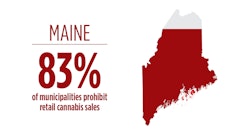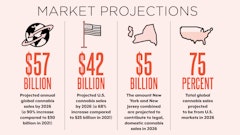
Once Gov. Phil Scott signs H.511 into law in Vermont, as he’s pledged to do, his state will become the ninth in the U.S. to have legalized adult-use marijuana. The bill legalizes the possession of up to one ounce for adults 21 and older. Vermont residents may grow plants, as well: Two mature plants or four immature plants are allowed at any given time. The law will take effect on July 1.
As 2018 gets under way, it doesn’t seem like Vermont will be alone this year. In New England’s six states, in particular, there’s a flurry of activity under way.
The New Hampshire House of Representatives recently approved an adult-use bill, and legislators in Rhode Island have been increasing the pitch of their debate over the winter.
Massachusetts’ adult-use retail market is expected to come online in July, and regional observers will be watching for examples of how to usher in reform legislation in their own states.
Whereas legalization was achieved through grassroots advocacy and voter efforts out West, state lawmakers across the U.S. are more willing than ever to test the merits of recreational marijuana bills.
“This is a complete short-circuit—in both Vermont and New Hampshire—which I think is a trend,” Josh Horn tells Cannabis Business Times, referencing the legislative path to legalization. Horn is a partner at Fox Rothschild LLP, where he’s been watching the cannabis industry set legal precedents.
Because of the nature of cannabis reform in the U.S., where voter attitudes are an important factor in what laws are passed in which states, there’s something of a domino effect at play. Colorado legalized adult-use marijuana in January 2014. Since then, voters in seven more states followed suit through a referendum process. Vermont’s action last week pushes that history in a new direction.
Matt Simon, New England political director at the Marijuana Policy Project, notes that Vermont had been teeing up a legalization effort for a while. “It’s something we’ve been working toward for a very long time, to get a state legislature to actually make this happen through that process and have a governor sign it,” he says. “Vermont’s been on the cusp before; we’ve been pretty close to making it happen in the last couple of years. It feels good to finally get it done. It would have been nicer to do it last year, but it’s never as soon as you want from an advocate’s perspective. Looking back and seeing the progress over the last decade is really stunning.”
Asked whether Vermont’s move might accelerate legislation across New England, Simon pointed out that there’s already a great deal of debate on tap for 2018: “I think the dominoes were certainly already lined up, regardless of which one fell first. Several states are going to be taking a very close look at that issue this year. Vermont happened to have it on the schedule for early January, having a bill held over from the last session. It worked out that they were able to go first and make history in that way.”
"The laws of prohibition are crumbling throughout the region, and it’s a question of details and timelines, as far as how each state moves forward.”
Already, Vermont lawmakers are discussing the ramifications of a tax-and-regulate commercial market in the state. Massachusetts’ program will surely serve as an example.
That’s because, ultimately, the geography of New England is an unavoidable subject here. Access to legal markets in other states may be as close as 10 miles down the road for residents in, say, New Hampshire. The proximity of a commercial market that’s bringing in a surge of tax revenue to neighboring states has no doubt put some pressure on legislators.
“I think there’s an awareness throughout New England that everybody’s connected to Massachusetts, and Massachusetts is moving forward,” Simon tells Cannabis Business Times. “The prospect of retail stores opening in July in a state that borders all the rest of New England—except Maine, which has its own law—is really part of the reality. The Senate Judiciary chair lives in Bennington, Vermont, 11 miles from the Massachusetts border. Look, people already have access to this in Bennington, but in six months they’re going to have access to a store right across the border. How can we not take that into account? That’s certainly been part of the narrative. The laws of prohibition are crumbling throughout the region, and it’s a question of details and timelines, as far as how each state moves forward.”
As a regional bellwether, the impact of an adult-use retail market in Massachusetts—a “first mover,” as Simon says—will likely be more immediate than it was in Colorado four years ago. Social attitudes toward legal adult-use markets have no doubt changed, as well.
Of course, the background of any legislation in early 2018 must include U.S. Attorney General Jeff Sessions’ repeal of the Cole Memo. After rescinding Obama-era protections for state-legal marijuana operations, the U.S. Department of Justice threw a degree of uncertainty into any conversation about legalization prospects.
“I think New Hampshire’s going to do what it wants to do,” Horn says. “And same with Vermont. Their respective governors will ultimately sign, I suspect, … statutes into law, and then they’ll proceed accordingly. … As a practical matter, I think, U.S. attorneys weren’t prosecuting anyone in the cannabis space unless they were acting outside of the state regulatory scheme.”
Regardless of that uncertainty—and Horn says he doesn’t see the Sessions move as having a major impact—there will always be some degree of advocacy work among cultivators, dispensary owners, patients and even observers.
In 2018, cannabis industry insiders will see a great deal of action in New England.
“There have been moments throughout the last several years where there’s a temptation to get frustrated—to throw your arms in the air and maybe give up on the process,” Simon says. “What this shows is being persistent and being patient with the process—continuing to engage legislators, and if they’re not being supportive you have to find out why not, find the information and the data and the expert and whatever it is that will get them onboard. Patient dialogue with people who aren’t there yet is the way to go. Everybody’s a ‘no’ before they’re a ‘yes’ on this issue. Very few politicians begin their careers—unless they’re beginning their careers now—… as supporters of legalization. The reality is we have to flip them from a ‘no’ to a ‘yes.’ Sometimes it’s easy and sometimes it takes a really long time, but most people get there eventually.”
Top photo by Marc Goebel/Flickr


























